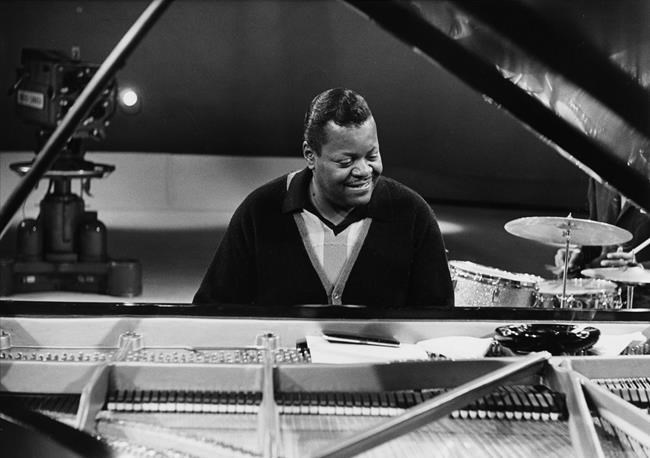
Canadian jazz piano impresario Oscar Peterson sits at a piano in a television studio in a January 26, 1963, handout photo. Peterson is the subject of the documentary "Oscar Peterson: Black + White," which premieres Saturday at the Toronto International Film Festival. THE CANADIAN PRESS/HO-Archives Radio-Canada, Andre Le Coz, *MANDATORY CREDIT*
Republished September 10, 2021 - 7:00 AM
Original Publication Date September 10, 2021 - 1:01 AM
TORONTO - Who should tell the story of acclaimed jazz pianist Oscar Peterson?
It’s a question that Canadian filmmaker Barry Avrich asked himself in the early days of production on his documentary "Oscar Peterson: Black + White," which premieres Sunday at the Toronto International Film Festival.
The film traces the exuberant highs and occasionally devastating lows of one of the country’s most cherished Black Canadian musicians, touching on his humble beginnings, his legacy in the music community and the racism he faced while on tour early in his career.
But as much as Avrich could relate to growing up in Montreal, not far from where the late Peterson once lived, he knew some might be less comfortable with a white Jewish filmmaker at the helm of a documentary about a Black artist. The film devotes much screen time to Peterson's "Hymn to Freedom," an anthem of the civil rights movement.
"I understood the burden that I had," Avrich explained in a recent interview. "Who am I to tell his story?"
With conversations proliferating in Canada's arts community about film and TV gatekeepers — and who gets to tell the stories of people of colour — having Avrich's name attached to this particular project is a beacon for criticism.
As the director of dozens of Canadian documentaries, several of them about entertainers including Howie Mandel and producer David Foster, he's among the country's most active filmmakers.
But Avrich said he didn’t want his involvement to distract from the film itself, so he committed to giving the late musician as much agency as he could to tell his own story.
Peterson died of kidney failure in 2007 at the age of 82, leaving behind hours of video interviews and performances.
"We completely scoured the world, finding his stories from interviews in Copenhagen, Stockholm, Tokyo, Berlin, Canada – everywhere we could," Avrich said.
"So this became the story of Oscar Peterson in his own words, not my words."
After much of that research had been completed, Oscar's widow Kelly Peterson said Avrich approached her to explain his intent.
Kelly began following the development of the documentary, and talked to Avrich about some of the people he wanted to interview and his vision for telling the story through archival interviews. She eventually took the title of consulting producer.
"It will be interesting to me to see if people do, in fact, think that does a disservice to Oscar because I don't," said Kelly, who is white. "I think Barry told the story through Oscar's words so beautifully."
Several voices offer perspective on Peterson's life, including Kelly who shares memories of their mid-life romance, which was his fourth marriage.
"He was human and humble and ordinary in an extraordinary way," she said of her late husband.
"I think of him always from all of those aspects and not just the icon. I sometimes forget that other people don't know that part of Oscar."
Avrich draws on new conversations with musicians who accompanied Peterson onstage and anecdotes from other famous artists, including Herbie Hancock, Quincy Jones and surprisingly Billy Joel, who counts himself as being deeply influenced by Peterson's jazz stylings.
A list of accomplished Canadian jazz artists including Robi Botos and Joe Sealy chip in by carrying Peterson’s torch with renditions of "Place St. Henri," "Orange Colored Sky," "C-Jam Blues" and other songs filmed inside a studio.
"Oscar Peterson: Black + White" was created in a matter of months. Last fall, Avrich got the green light from Randy Lennox, then president of Bell Media, and cameras started rolling by February.
"The film came together as fast as Oscar played his own music," he said.
In the editing room, Avrich strove to replicate "the pacing of a freight train" by speeding through Peterson's rise to fame and doling out musical numbers with a kinetic energy that rarely lets up.
Occasionally, the film does pause to digest the more painful experiences Peterson faced, including racism during his tours of the southern United States and his three broken marriages.
Avrich doesn't wallow in the misery for long, though, which he said was an intentional decision.
"There was drama in his life," Avrich acknowledged, "but I really wanted this to be a tribute piece to him."
Avrich hopes "Oscar Peterson: Black + White" could lead to other projects that explore the unsung history of Black-Canadian music.
He sees potential in a multi-part docuseries that would focus on the likes of gospel and reggae singer Liberty Silver, late blues artist Salome Bey and Broadway actress Jackie Richardson who each had their own under-acknowledged influence on music history beyond Canada's borders.
"When most people think jazz they think they think it's an American phenomenon," he said.
"I'm hoping this film inspires other filmmakers and storytellers to talk about those other artists."
Follow @dfriend on Twitter.
This report by The Canadian Press was first published Sept. 10, 2021.
News from © The Canadian Press, 2021